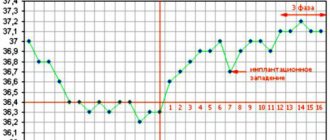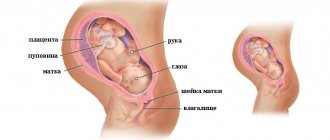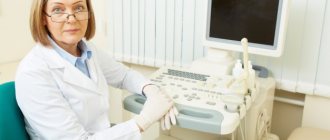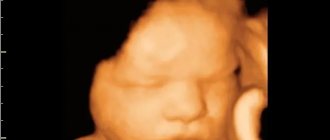We continue to talk about how mother and baby feel at different stages of pregnancy. Our permanent expert, candidate of medical sciences, obstetrician-gynecologist, gynecologist-endocrinologist Maria Prokhorova the questions of the FAN .
The time has come for the 12th week of pregnancy, which ends the difficult and exciting first trimester. The greatest vulnerability of the embryo to external environmental conditions is behind us, all associated fears and anxieties are behind us, toxicosis is slowly receding, and ahead of the expectant mother is a pleasant and calm state, which lasts from approximately 12 to 24 weeks and is called the “golden” period of pregnancy.
The interesting position remains a mystery to others, and the barely noticeable growth of the belly is still easy to hide under looser clothing. It is, of course, too early for the first movements, but the hormonal storm has calmed down a little, the woman has already gotten used to her new state and is preparing every day for the responsible role of a future mother.
At this stage, the baby is still too small to show any noticeable presence inside the abdomen, and the woman can’t wait to see what the baby looks like, at least in an ultrasound photo. Well, soon she will be given such an opportunity, because the 12th obstetric week of pregnancy is the optimal period for carrying out the all-important first screening.
We will tell you what interesting things happen to the baby and mother during this period, what examinations need to be completed to make sure that everything is going as it should.
pixabay.com/raman bhardwaj
Fetal development at 12 weeks of pregnancy
Over the past three months, the baby has grown significantly - its weight is now approximately 17–18 g, and its length has reached 6–8 cm. The size of the fruit at this stage resembles an average lemon. Maria Prokhorova says that the baby is becoming more and more human-like, but still has a disproportionately large head compared to the rest of the body.
All the main organs and tissues have already been formed, and now they are gradually developing and improving. Some systems are even capable of fully functioning. Let us list the most significant changes occurring during this period.
- The first hairs appear on the tiny body.
- The fingers and toes are no longer webbed.
- Nail plates are forming in full swing.
- The heartbeat can be clearly heard.
- The gastrointestinal tract is slowly forming, and bile begins to be produced.
- The laryngeal muscles improve the swallowing process, and the fetus is already able to swallow a small amount of amniotic fluid, which is eliminated through the genitourinary system.
- The endocrine system gradually develops.
- The thymus gland, one of the main components of the immune defense, matures; this gland produces lymphocytes and stimulates the production of antibodies.
- The skeleton is still represented by soft cartilaginous tissue, but is already at the ossification stage.
- As for the nervous system, it is slowly but surely becoming more and more perfect. So far, the first manifestations of facial expressions are present at the reflex level: the baby can close his eyes, open and close his mouth. He involuntarily moves his arms and legs. There is a movement of the chest, which simulates a full respiratory cycle. The sucking reflex develops.
- The future facial features of the baby are becoming more and more clearly visible.
- The placenta continues its formation - a temporary organ formed from the chorion and primarily performs the function of protecting the fetus from any adverse effects from the outside. The process of placenta maturation is finally completed at 14–16 weeks. Some expectant mothers are diagnosed with chorionic presentation based on the results of an ultrasound examination. Maria Prokhorova explains that this phenomenon does not pose absolutely any danger and as the uterus grows, the placenta will gradually rise with it.
How does a mother feel at 12 weeks of pregnancy?
So, the most unpredictable and risky period for nascent life has passed, the baby has become quite firmly entrenched and continues its active development. The most important thing for him now is his mother’s peace and well-being. What important changes occur in a pregnant woman’s body and how does she feel by the end of the first trimester?
By this time, the woman gets used to her new condition, she is a little less worried about toxicosis, and the constant discomfort and weakness gradually disappear. Do not worry if morning sickness still persists; the completely unpleasant symptom will go away a little later - by 14–16 weeks, when the placenta is already fully formed.
pixabay.com/Philip Walker
Maria Prokhorova warns about possible small changes in bowel function.
“Now and in the future, it is very important that a woman has more regular bowel movements, and this needs to be monitored,” comments the obstetrician-gynecologist.
Proper nutrition, eating plenty of green vegetables, maintaining a drinking regime and moderate physical activity will help improve the functioning of the gastrointestinal tract.
The uterus continues to increase in size; it has long gone beyond the womb and is gradually rising into the abdominal cavity. Due to this, it puts slightly less pressure on the bladder, and the frequency of the urge to urinate decreases, but it can put pressure on the intestines, causing some discomfort.
As a rule, by this time a woman may feel tight in her favorite trousers or skinny jeans due to her growing belly. Already at this stage, the pregnant woman is recommended to wear more comfortable clothes. The same applies to underwear. The bra should be comfortable and soft so as not to disrupt the blood circulation in the enlarging mammary gland.
Changes in the skin may appear in the form of age spots, which sometimes accompany pregnancy and greatly frighten expectant mothers.
“This is due to the active action of hormones,” reassures Maria Prokhorova. “Such nuances, as a rule, go away either immediately after childbirth or within a short time.”
There is also good news - during this period, many women note that their hair has become more voluminous, voluminous and shiny, and the condition of their nails has noticeably improved.
After the 12th week, the pregnant woman is no longer tormented by emotional swings. The hormonal levels are more or less normalized, and the mood becomes more stable. However, close people should not forget that a woman is still under the influence of hormones, so emotional outbursts are normal. You need to treat this with understanding and have a little patience. Now, more than ever, the expectant mother needs support and love from her family.
At this stage, a slight weight gain is already possible, but the doctor warns that it should not exceed 2.5 kg and recommends trying not to gain more than 300 g per week. There are women who do not add at all to this point, this is also a variant of the norm.
The discharge should be mucous and transparent, and may become slightly more abundant than before. This is fine. But pain in the lower abdomen should ideally not bother a woman.
“Mild sipping pains are possible,” explains Maria Prokhorova. “Sometimes they can be associated with constipation, but nevertheless it is better to consult a doctor promptly if any pain occurs.”
Abdominal pain on the right: causes
Pain in the right hypochondrium is characteristic of gallbladder diseases: cholecystitis, cholelithiasis, biliary dyskinesia. With cholecystitis, there is an increase in temperature, nausea with bouts of vomiting. With cholelithiasis, paroxysmal pain occurs when the stone moves and the exit from the gallbladder is blocked. The pain can radiate to the lower back, under the right shoulder blade, into the arm, accompanied by nausea and repeated vomiting.
Abdominal pain on the right is the main symptom of acute appendicitis. The pain often begins in the upper abdomen and then moves to the right iliac region. Aching pain in the navel area with appendicitis can mimic the symptoms of gastritis and intestinal colic. Acute appendicitis is diagnosed by characteristic symptoms during palpation of the abdomen. In addition to appendicitis, Crohn's disease can provoke pain in this part of the abdomen. Read more about the disease on our website Dobrobut.com.
Gynecological pathologies are also characterized by pain in the right or left groin and suprapubic region.
Such pain can signal serious pathologies:
- apoplexy (rupture) of the ovary;
- ectopic (ectopic) pregnancy;
- salpingo-oophoritis;
- twisting of the legs of a cyst or ovarian tumor.
What examinations need to be completed at 12 weeks?
Despite the fact that the most dangerous time for the fetus is already over, the risks of a frozen pregnancy exist at any stage, so the expectant mother must register with the antenatal clinic, if she has not already done so, be regularly monitored and undergo all examinations prescribed by the doctor. .
Maria Prokhorova warns that it is not possible to independently determine the child’s condition, since the woman does not yet feel fetal movements, and heartbeat parameters cannot be determined at home, even with the help of special sensors.
“There may be a slight deterioration in health,” explains our expert. “But this is not a direct sign of a missed abortion, so women undergo a screening examination at this stage, and if they feel unwell, they should consult a doctor.”
pixabay.com/No-longer-here
Therefore, expectant mothers are advised to register for pregnancy as early as possible. By the way, for registration up to 12 weeks you even receive some benefits from the state. The payout is small, but still.
Important! At 12–13 weeks, the first prenatal screening is carried out, which makes it possible to identify possible fetal malformations at an early stage, if any.
This most important examination includes a highly professional ultrasound and a special blood test. Diagnosis should be performed by a doctor who specializes in performing such screenings. Using the device, the doctor will see the general condition of the baby, as well as a number of important parameters, such as the thickness of the nuchal translucency (NVP), the length of the nasal bone, the coccygeal-parietal size, head circumference and some others.
Many parents can't wait to find out the gender of their unborn child. Maria Prokhorova explains that at week 12 one can only guess whether a boy or a girl will be born, but the gender can only be reliably determined by a blood test. Or you will have to wait for the next scheduled ultrasound, which is done at 20–22 weeks.
On the day of the ultrasound examination, the patient simultaneously donates blood, which is sent to the laboratory, where a special program calculates the genetic risks of the fetus.
Sometimes it happens that bad results come. In this case, Maria Prokhorova urges, first of all, not to panic, since the screening parameters are influenced by many factors, including, for example, age calculation. If the future parents are over 35 years old, then the program automatically includes an age parameter and the results will be slightly worse than for younger patients. In any case, the decision always remains with the woman, and the doctor has no right to incline her in one direction or another. He can only reassure, support and inform about possible options for the development of events.
If a woman has not yet had time to be examined when registering, then the first screening can be combined with a classic examination and a general blood and urine test. In addition, now is the time to visit specialists. On the mandatory list:
- therapist;
- dentist;
- otolaryngologist;
- ophthalmologist;
- other doctors - if indicated.
Miscarriage and its causes
Statistics show that about 20% of pregnancies end in spontaneous abortion. Depending on the timing, doctors distinguish between several types of miscarriages. They most often occur in early pregnancy.
Medicine is developing at a rapid pace, which makes it possible to deliver children born prematurely. However, for up to 12 weeks there is no talk of preserving the fetus.
The main causes of early miscarriages are:
- Hormonal imbalance in a woman. The problem can be solved by timely treatment, in which medications are prescribed to compensate for the lack of hormones.
- Genetic disorders in fetal development. Perhaps the influence of heredity or the occurrence of some mutation.
- Some infectious diseases in the mother during pregnancy.
- Poor environmental conditions.
- Smoking, alcohol, unhealthy lifestyle.
- Previous abortions.
- Lifting weights.
- A fall.
- Stressful situations.
Any of the above points can lead to spontaneous abortion. The presence of several factors acting on the female body at the same time will only increase the overall harm.
In later stages, the main causes of miscarriages are considered to be the woman’s chronic diseases, as well as cervical problems.
To prevent the possibility of miscarriage and be able to bear a healthy child, you need to regularly visit a gynecologist. A women's health specialist will always help you find happiness in motherhood. The important female function of reproduction should be taken responsibly, starting from a young age. After all, in the end, a person lives in order to continue himself in children.









